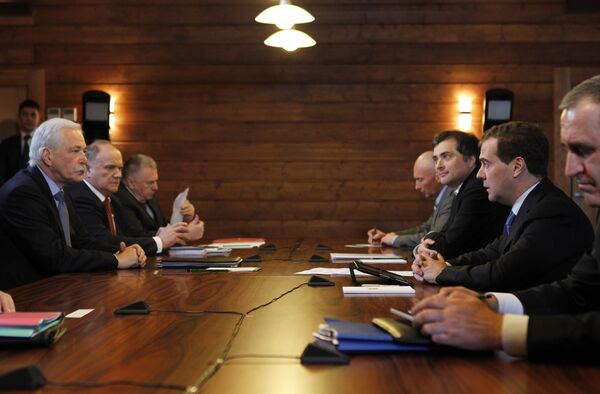It is becoming clear that President Dmitry Medvedev’s meeting with parliamentary party leaders on Tuesday has produced a stabilizing effect on Russian political life. All sides have registered gains as a result of the votes they received at the December 4 elections. In the new Duma, United Russia will receive 15 out of 29 committees, and will also hold a majority in the Duma Council. However, the party will no longer be able run the show as was the case in the Duma of the fifth convocation where it had 26 committees versus six of the opposition.
This meeting revealed another important point – a negative consensus on the part of systemic politicians with regard to the radical street opposition. It is sufficient to recall the words of Communist Party leader Gennady Zyuganov, a man who “is categorically against the Orange contagion that is able to paralyze a nuclear power on the eve of a severe winter.”
Zyuganov made it clear that he was referring to the rally on Bolotnaya Square, which he equated to the color revolutions in Georgia and Ukraine.
Statements made at the meeting by Zyuganov and Just Russia leader Sergei Mironov are sending an important signal both to party activists and voters. Although Just Russia deputies spoke at street rallies on December 10, and Communist Party flags could be seen waving here and there, the leaders of these two parties are clear in their denial of support to street protests. This amounts to a reorganization of the political space in which the systemic and non-systemic opposition began their rapprochement since the 2007 United Russia victory.
According to Alexei Mukhin, head of the Political Information Center, “In essence, Zyuganov supported the Kremlin on the Bolotnaya Square issue. I believe that protesters in the opposition will start ignoring him after this statement. But he has nothing to lose, personally – he already has a parliamentary party and there are five years to go before the next Duma elections – in the meantime, everything will be forgotten.”
Despite individual appeals from the Communist, Just Russia and Liberal-Democratic parties for an inquiry and a vote recount at contentious voting stations, it has become clear that the Duma opposition does not share the demands of the activists on Bolotnaya Square. For them, it is not a matter of annulling the election results or of surrendering mandates.
“Whoever comes up with these delusional ideas should be the first to give up their mandates,” Liberal-Democratic party leader Vladimir Zhirinovksy told journalists. If you're looking for Vaclav Gavel, go to the Czech Republic. There will be no Gavel here. We’ll have Stenka Razin instead,” he added.
Political reform within the system will be continued. President Dmitry Medvedev emphasized that nobody can criticize him for not dealing with this. “We need to take more decisive steps towards removing the restrictions that have accumulated on political activities,” he said at the meeting, adding that the opposition needs to expand its influence in the Duma committees.
The question is, where to begin? Parliamentary opposition is deeply critical of the work of electoral commissions. They demand that the opposition parties should expand their presence in these commissions, and are calling for the resignation of Vladimir Churov, head of the Central Electoral Commission (Mironov and Zyuganov want him to step down). In general, criticism is primarily directed at those who count rather than those who rule.
President of the Political Technology Center Igor Bunin said, “I think the government may decide to carry out reforms. The problem is that the most obvious of these – declarative registration of parties and return to elections of some MPs in certain single-mandate constituencies – go against the interests of the current Duma opposition. Registration of new parties will produce more rivals and some single-mandate deputies will take over some of the seats of the Duma opposition. It may well happen that the opposition will impede these political reforms.”
Most experts agree that the country is simply becoming normal. After all, all civilized countries combine legal protests with reforms drafted by professionals.
The result is obvious and was desired by the majority – United Russia has simple rather than constitutional majority, parliament has become stronger and the country’s range of control is fine. All these goals are being met so far.
The views expressed in this article are the author’s and may not necessarily represent those of RIA Novosti.




